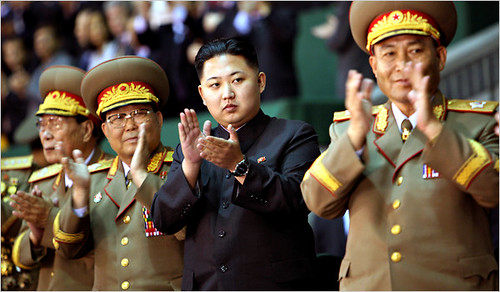
Kim Jong-un, the son of Kim Jong-il, stands third from the left at a conference commemorating the 65th anniversary of the Korean Worker's Party, the ruling party of the Democratic People's Republic of Korea (DPRK)., a photo by Pan-African News Wire File Photos on Flickr.
FEBRUARY 24, 2012, 12:19 P.M. ET
U.S., North Korea Talks See Little Progress
By BRIAN SPEGELE
Wall Street Journal
BEIJING—U.S. and North Korean officials completed negotiations in the Chinese capital on Friday with little visible progress toward bringing Pyongyang back to nuclear-disarmament talks, suggesting the North's stance hasn't changed despite new leadership.
Glyn T. Davies, the U.S. special representative for North Korean policy, said the countries also failed to reach concrete deals on food aid to the North or other issues. He added that he had detected few differences in negotiating tactics by Pyongyang's envoys under the new regime of Kim Jong Eun.
"There was nothing stylistically or substantively dramatically different in terms of how the North Koreans were presenting their positions," Mr. Davies said at a news conference following the talks. "I'm not saying that is a good thing or a bad thing. That is simply my impression from having dealt with them."
He declined to specify further what U.S. negotiators were able to glean about the new regime.
The meetings this week were the first formal chance for U.S. and North Korean envoys to meet following the death of former dictator Kim Jong Il late last year. The meetings on Friday between Mr. Davies and veteran North Korean envoy Kim Kye Gwan were an extension of negotiations that began Thursday and were unexpectedly extended into a second day.
"I think we made a little bit of progress," Mr. Davies said, adding that the new leadership's willingness to talk so soon after the transitions in and of itself is positive and demonstrates a degree of progress.
Analysts had previously said an agreement on resuming U.S. food aid to North Korea would be an indication that Kim Jong Eun had firmly consolidated political power and was willing to forge ahead on negotiating with Washington. The U.S. has pushed for more robust monitoring of food-aid distribution in North Korea, and it remains unclear which specific stumbling blocks are hampering a deal.
A food-aid plan would likely be the first step in tackling the relationship's tougher issues, including the North's nuclear-weapons ambitions, analysts say. Pyongyang previously has claimed the U.S. linked food-aid offers to its nuclear program. Washington denies the issues are linked. Many believed the countries were near to a food-aid deal shortly before Kim Jong Il's death.
In the first public statement made by Kim Jong Eun's regime toward Washington in January, Pyongyang slammed the amount of aid the U.S. was offering, as well as the conditions tied to it.
Mr. Davies will meet officials in Seoul and Tokyo over the weekend, in a chance to liaise with fellow participants of the stalled six-party negotiations. Russia, China, the U.S., both Koreas and Japan are members to the six-party talks.
North Korea has said for more than a year that it is ready to return to six-party negotiations, which it said in 2009 that it would boycott. The U.S., together with South Korea, has said the North must demonstrate concrete steps toward suspending its nuclear program before six-party talks can resume.
Write to Brian Spegele at brian.spegele@wsj.com
No comments:
Post a Comment